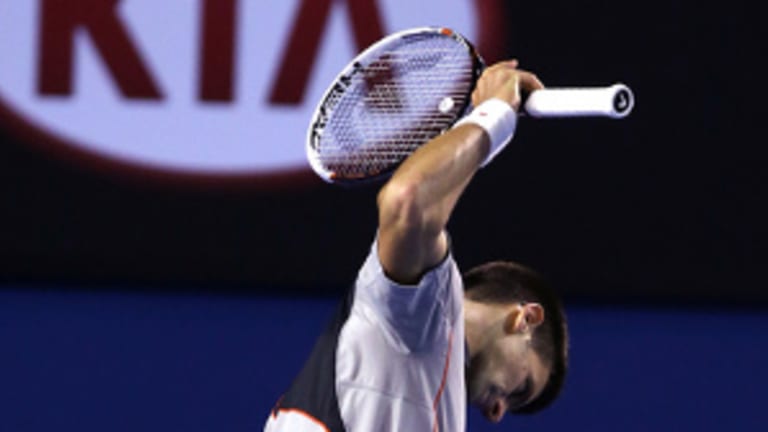It was a tough assignment to command the spotlight at the Australian Open this year, what with Stanislas Wawrinka belting his way to his first Grand Slam title, Rafael Nadal staggering out of Melbourne with a bad back, a spate of stirring upsets on the women’s side—including Serena Williams’ shocking defeat—and yet another Roger vs. Rafa clash.
Meanwhile, Novak Djokovic got lost in the shuffle. Oh, the world No. 2 collected a measure of headlines and interviews—how could he not? But much of the attention centered less on Djokovic than on his new coach, media magnet Boris Becker. In some ways, Djokovic seemed like the forgotten man at this major. He was the guy everybody took for granted, but not necessarily in a good way.
It was weird, given what Djokovic and the tournament had meant to each other. He was not just the defending champ, he was gunning for his fourth consecutive title and riding a 28-match win streak that was finally halted by Wawrinka in the quarterfinals, in reprisal of their epic clash in 2013, the one that Djokovic won.
The frustrating end to Djokovic’s defense also highlighted, for anyone who cared to look, a larger and perhaps more puzzling dilemma: Djokovic has now lost at seven of the last eight majors.
It would be one thing if those seven defeats ended with Djokovic outplayed by a peer whose game he was hard put to solve, or unexpectedly upset in a fourth round here, a quarterfinal there. But the astonishing thing is that Djokovic, the pile-driving baseliner who has won 15 of his 31 matches with Federer and who as recently as 2012 had a seven-match winning streak against Nadal, has been looking, acting, and playing like a champ. The only thing he hasn’t done is win.
Djokovic is a truly great player; the most convincing proof of it is his record against his cohorts in the “Big Four.” Has there ever been a player so good, whose failures over the course of about two years are so difficult to explain?
One thing we know for sure: Whatever is going on with Djokovic, it has little to do with forehands and backhands. He doesn’t have a nemesis, or some extra-technical weakness, like poor mobility or sub-par stamina or focus. This guy does everything exceptionally well, until he doesn’t. And that “doesn’t” tends to kick in when it could just as easily go the other way.
It’s hard to say that Djokovic was out-played in many of those seven losses. The other guy often won because of a hiccup. A moment’s inattention. He won because somebody must, just like plucking petals in the “she loves me, she loves me not” game always leaves the love-struck hero with one answer or the other.
